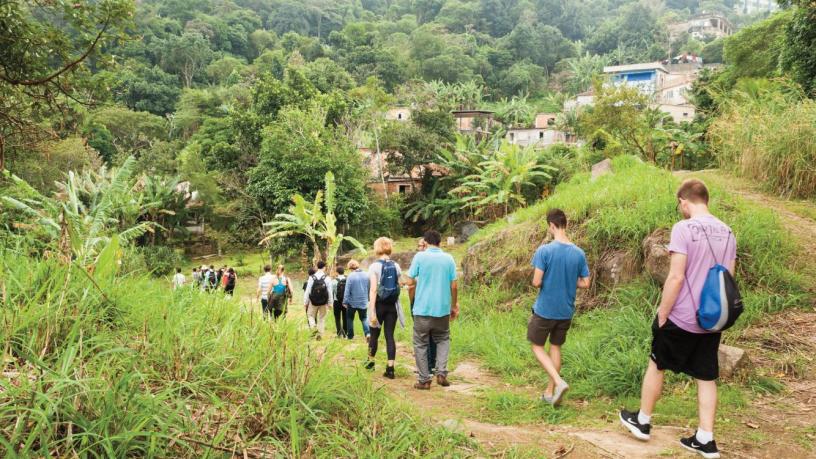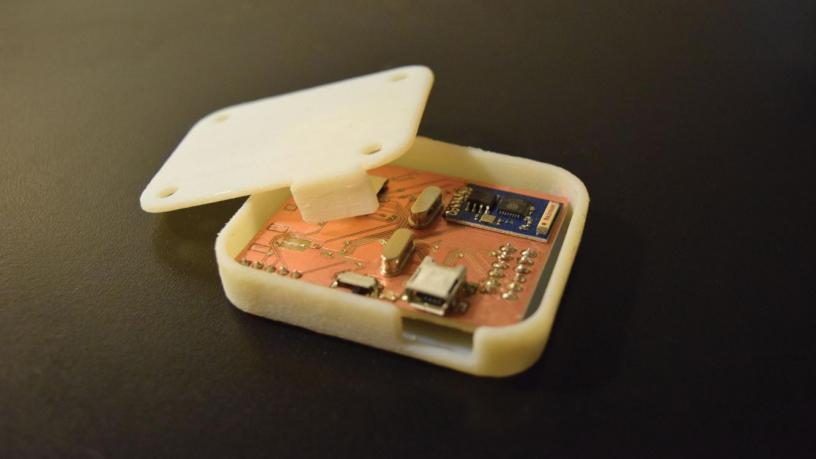Supporting the Startups
The Engineering School has made promoting entrepreneurship in its students a top priority—and the results speak for themselves.
Under Dean Mary C. Boyce, Columbia Engineering is laser-focused on teaching skills, encouraging collaboration, and giving students and recent grads a boost in the startup sector.
“A lot of students—even if they plan to take a traditional job after they graduate—will have in the back of their mind that they are building a skill set to take with them to build their own company,” said Ivy Schultz, associate director of Entrepreneurship Programs for Columbia Engineering. “I think people know they’ll change jobs, and the skills of entrepreneurship are transferable.”
“Dean Boyce is very much into supporting student initiatives and interests,” agreed Paula Anzer, director of Strategic Initiatives for the Engineering School. “And one of the things our students and faculty are passionate about is solving real-world problems and having a global impact.”
Combining the two is the name of the game with the Columbia Design Challenge, launched in 2014 with a focus on the Ebola crisis.

Rio Design Challenge participants and faculty on a field trip to Vale Encantado, a favela community in Rio. One of the teams is working with the community to use a bio-digestor to convert waste to bio-gas (Photo by Gabi Carrera)
For the second and latest edition, students were asked to bring their most innovative ideas for addressing issues with urban water and sensing technologies. It was run in partnership with the Columbia Global Center in Rio de Janeiro; and on May 31, Columbia community members, including Dean Boyce and 22 students, traveled to Rio to present their design concepts, meet with colleagues, and tour facilities at partner school COPPE/UFRJ, Rio de Janeiro’s federal university. They saw firsthand how water and wastewater treatment affect the city and how using wireless sensing technology could have a great impact on the Rio environment.
Founded last year by biomedical engineering master’s students Sona Shah MS’16 and Teresa Cauvel MS’16, Neopenda started as a class project in Katherine Reuther’s biomedical design class. The result—a wearable vital-signs monitor designed for use on newborns in developing nations—got a huge boost after placing third in the Global Technology Challenge track at the 2015 Columbia Venture Competition. Shah and Cauvel used the $10,000 cash award to fund a two-and-a-half-week trip to Uganda, where the women visited nine different public and private hospitals in four different cities and met with NGOs and government entities to better understand the country’s newborn health priorities.
“What we had been missing was a deep understanding of conditions on the ground,” Shah said. “The trip was a turning point in realizing that there was a huge need, even in the most sophisticated hospitals. It was validation that what we were doing was appropriate and needed.”
In the year since, Shah and Cauvel have made huge strides. Following their first Uganda trip, they were accepted into the inaugural Relevant Health accelerator program in D.C.—the women took classes remotely and traveled back and forth to Columbia for five months while intensely focusing on moving Neopenda forward. They launched a Kickstarter campaign (raising $40,953) and kept pitching. In the past year, Neopenda took first place finishes in the 2016 Columbia University Women Entrepreneurs Pitch Competition, the Cisco Internet of Everything Challenge at the 2016 Rice Business Plan Competition, and the 2016 Vodafone Americas Foundation Wireless Innovation Project—and both Shah and Cauvel graduated.
This summer, they flew to Uganda for a second time to meet with partners—including members at their pilot hospital partner, St. Francis Hospital Nsambya, in Kampala—in preparation for their next steps.
“We can’t thank Columbia enough at this point,” Shah said. “The mentorship from Dr. Aaron Kyle and Dr. Reuther, who are on our advisory board, has been phenomenal. It’s where we started.”
Startup CarboCycle, which focuses on converting organic waste into palm oil substitutes, also attributes its recent momentum to its big win in this year’s Columbia Venture Competition.
“The biggest thing the Venture Competition did was turn our idea into a potentially viable business,” Shashwat Vajpeyi PhD’16 said.
Vajpeyi is CEO of CarboCycle, first-place winner in the 2016 Venture Competition Global Technology Challenge track. Now that most of its members have finished their degrees, Vajpeyi remarked that CarboCycle is focusing on launching a pilot program to collect food waste for conversion—possibly even at Columbia. (CarboCycle is currently in talks with the University, among other potential clients.)
“Even besides the Venture Competition, the School has been very supportive, helping connect us to lawyers and other resources,” he said. “Especially for us, who had no idea about how to develop a [business] plan, it’s very helpful.”

Prototype of Neopenda’s neonatal vital signs monitor (Photo courtesy of Neopenda)
